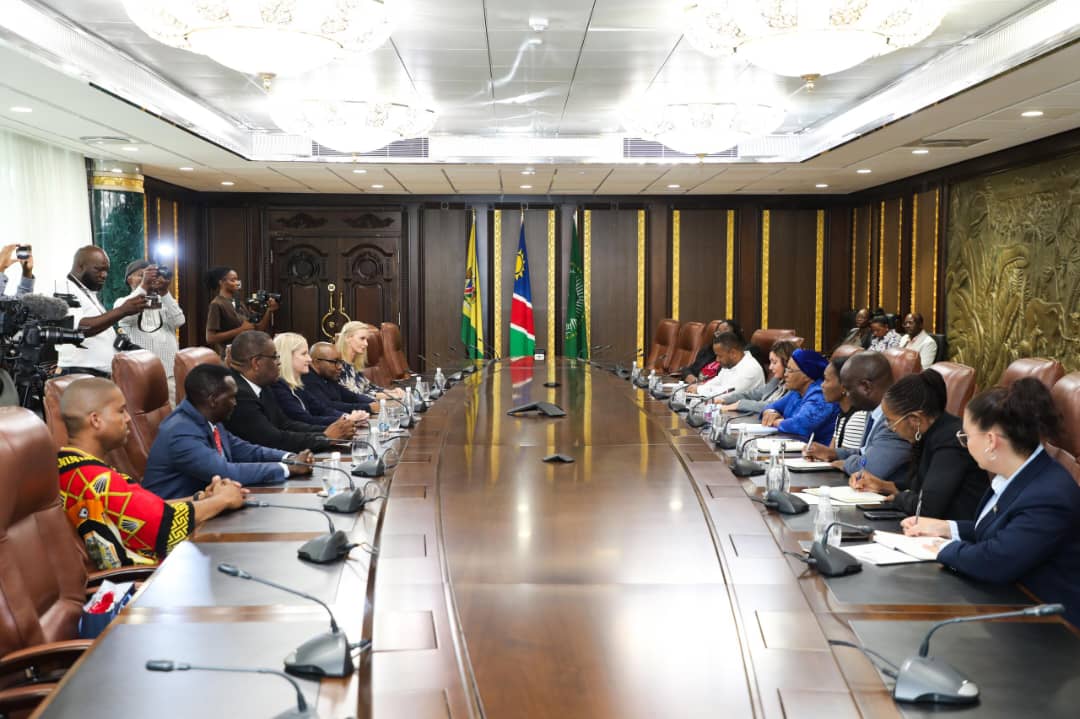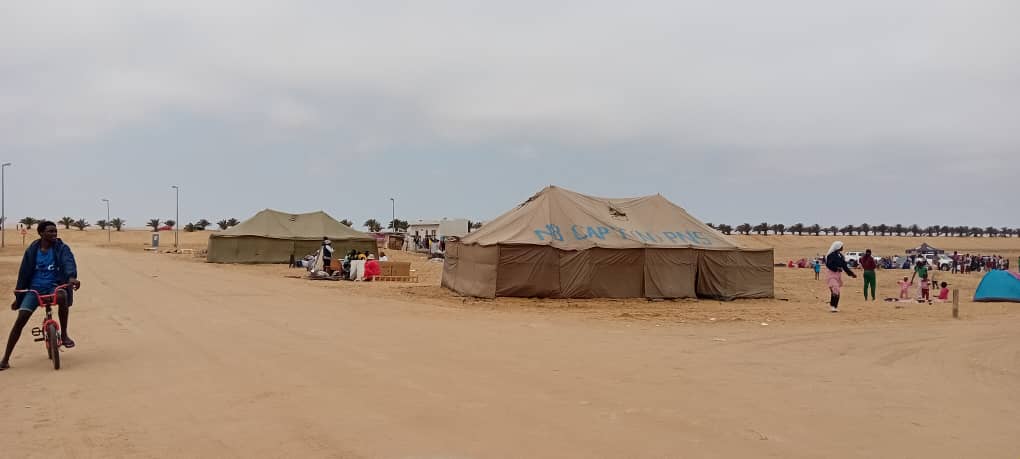REGULAR political communication is an essential part in the process of democratisation.
In recent weeks, two issues underlining a dangerous culture of withholding information were revealed, with possible disastrous consequences for our democracy. First, reading that the opposition parties attended a secret meeting at the Office of the Prime Minister at which constitutional amendments were discussed is enough to make one feel as if your liver is being removed without anaesthesia.The opposition is the custodian of transparent governance, in particular when it relates to issues that have no security implications.Amending the Constitution in a democracy does not fit that definition.So, the question that props up is why such a debate, or even why the initiative itself, is withheld from the broader public eye.Second, the discussion about splitting the functions of the Attorney General from those of the Minister of Justice was revealed in a newspaper exposé as having gone on for a while as a top secret in the form of a letter within the Office of the President.Ordinarily, such a discussion is about creating the best possible institutional fit to effect good governance and not about Pendukeni Ithana per se.If it relates to the individual, the Swapo party has a common sense congress resolution of last year that calls for the Secretary General of the Party to commit full-time to party affairs.Additionally, common sense would dictate that even if an individual had super-human abilities, it is difficult to occupy these three positions and excel at them in equal measure.It begs then the question as to what purpose such a discussion has if it does not involve Pendukeni Ithana as the incumbent regarding the changes.Secrecy in this case would make it appear as if the process is aimed at annoying the individual, while in essence it shouldn’t.As consequences of these events (among others), it is hard to form an idea about the intended finalities of our current efforts at consolidating democracy.It is equally difficult to discern as to which countries or models inspire our democratic process.Africa does not have many success stories for our young democracy, nor does it have strong continental democratic institutions that could serve as a guidepost for the process of democratisation in respective countries as is the case with the European Union and its conditionalities for membership.Therefore, as a young country, it is important that we have a certain vision or a model of democracy.To do so, would demand, not just improvising dangerously, but also studying the democratic success stories elsewhere.It would mean, observing – like a student doing an internship – with the world, notably its success stories as the place for that internship.In Robert Dahl’s classification of democracy as “participation and contestation”, we exist as a realistic democracy.But I believe that our discussion must be replaced by efforts aimed at understanding the nature of democratic institutions, how they function, and the reasons why they develop and collapse.We need to note that at some point Robert Mugabe’s Zimbabwe met the definition advanced by Joseph Schumpeter in his path-breaking study, Capitalism, Socialism and Democracy: democracy as a process of fair, honest and periodic elections through institutional arrangements.But this didn’t stop Mugabe’s Zimbabwe from descending into despotism.Thus, the demand for thinking and leading like democrats is urgent.I have bemoaned the lack of political communication on the part of government, even if I am not too sure if it is a failure of the media to probe government effectively.But the reality is that we have internalised a dodgy political culture (largely perfected in liberation politics), which shrouds everything in secrecy, even the most mundane of issues.The process of amending the Constitution is not the business of the executive and opposition MPs invited for secret meetings, it should be the people’s choice to debate the pros and cons of such amendments.Even if we don’t raise objections, the right to that information is a cardinal principle of democratic governance.Progressive governance would imply throwing the idea out for public consumption, even if a draft amendment does not exist.It could be a presidential statement or a press conference selling the thought or the reasons for the amendments.With regard to the split of the AG and Minister of Justice position, we need to place the public good above individual interests or settling scores through tinkering with public offices.We have personalised offices to the point where we can’t even discuss the nature of offices or their relevance in changing governance conditions.If separating these offices is not aimed at settling political scores, and I assume and hope it is not, why keep it a secret from the individual concerned? In fact, Ithana must be part of the process from the very beginning.Confident and inclusive regimes are transparent and they don’t fear public opinion, nor do they personalise office.If government goes about its business in secret, the consequences for our democracy are too ghastly to contemplate.To avoid this, we may have to start distributing Samuel Huntington’s work “The Third Wave: Democratization in the late Twentieth Century” to our elected officials for practical advice on how to succeed in the process of democratisation.* Alfredo Tjiurimo Hengari is a PhD fellow in political science at the University of Paris- Panthéon Sorbonne, France.First, reading that the opposition parties attended a secret meeting at the Office of the Prime Minister at which constitutional amendments were discussed is enough to make one feel as if your liver is being removed without anaesthesia.The opposition is the custodian of transparent governance, in particular when it relates to issues that have no security implications.Amending the Constitution in a democracy does not fit that definition.So, the question that props up is why such a debate, or even why the initiative itself, is withheld from the broader public eye.Second, the discussion about splitting the functions of the Attorney General from those of the Minister of Justice was revealed in a newspaper exposé as having gone on for a while as a top secret in the form of a letter within the Office of the President.Ordinarily, such a discussion is about creating the best possible institutional fit to effect good governance and not about Pendukeni Ithana per se.If it relates to the individual, the Swapo party has a common sense congress resolution of last year that calls for the Secretary General of the Party to commit full-time to party affairs.Additionally, common sense would dictate that even if an individual had super-human abilities, it is difficult to occupy these three positions and excel at them in equal measure.It begs then the question as to what purpose such a discussion has if it does not involve Pendukeni Ithana as the incumbent regarding the changes.Secrecy in this case would make it appear as if the process is aimed at annoying the individual, while in essence it shouldn’t. As consequences of these events (among others), it is hard to form an idea about the intended finalities of our current efforts at consolidating democracy.It is equally difficult to discern as to which countries or models inspire our democratic process.Africa does not have many success stories for our young democracy, nor does it have strong continental democratic institutions that could serve as a guidepost for the process of democratisation in respective countries as is the case with the European Union and its conditionalities for membership.Therefore, as a young country, it is important that we have a certain vision or a model of democracy.To do so, would demand, not just improvising dangerously, but also studying the democratic success stories elsewhere.It would mean, observing – like a student doing an internship – with the world, notably its success stories as the place for that internship.In Robert Dahl’s classification of democracy as “participation and contestation”, we exist as a realistic democracy.But I believe that our discussion must be replaced by efforts aimed at understanding the nature of democratic institutions, how they function, and the reasons why they develop and collapse.We need to note that at some point Robert Mugabe’s Zimbabwe met the definition advanced by Joseph Schumpeter in his path-breaking study, Capitalism, Socialism and Democracy: democracy as a process of fair, honest and periodic elections through institutional arrangements.But this didn’t stop Mugabe’s Zimbabwe from descending into despotism.Thus, the demand for thinking and leading like democrats is urgent.I have bemoaned the lack of political communication on the part of government, even if I am not too sure if it is a failure of the media to probe government effectively.But the reality is that we have internalised a dodgy political culture (largely perfected in liberation politics), which shrouds everything in secrecy, even the most mundane of issues.The process of amending the Constitution is not the business of the executive and opposition MPs invited for secret meetings, it should be the people’s choice to debate the pros and cons of such amendments.Even if we don’t raise objections, the right to that information is a cardinal principle of democratic governance.Progressive governance would imply throwing the idea out for public consumption, even if a draft amendment does not exist.It could be a presidential statement or a press conference selling the thought or the reasons for the amendments.With regard to the split of the AG and Minister of Justice position, we need to place the public good above individual interests or settling scores through tinkering with public offices.We have personalised offices to the point where we can’t even discuss the nature of offices or their relevance in changing governance conditions.If separating these offices is not aimed at settling political scores, and I assume and hope it is not, why keep it a secret from the individual concerned? In fact, Ithana must be part of the process from the very beginning. Confident and inclusive regimes are transparent and they don’t fear public opinion, nor do they personalise office.If government goes about its business in secret, the consequences for our democracy are too ghastly to contemplate.To avoid this, we may have to start distributing Samuel Huntington’s work “The Third Wave: Democratization in the late Twentieth Century” to our elected officials for practical advice on how to succeed in the process of democratisation.* Alfredo Tjiurimo Hengari is a PhD fellow in political science at the University of Paris- Panthéon Sorbonne, France.
Stay informed with The Namibian – your source for credible journalism. Get in-depth reporting and opinions for
only N$85 a month. Invest in journalism, invest in democracy –
Subscribe Now!










